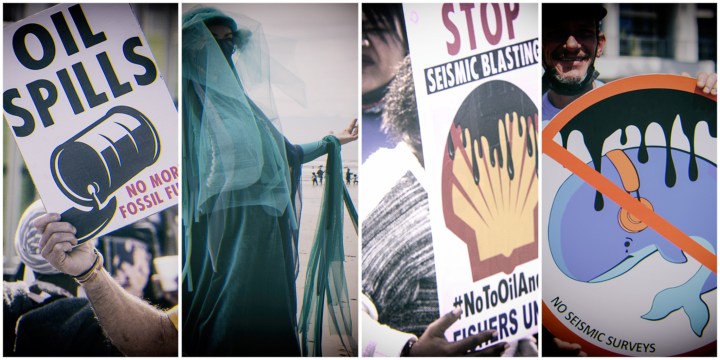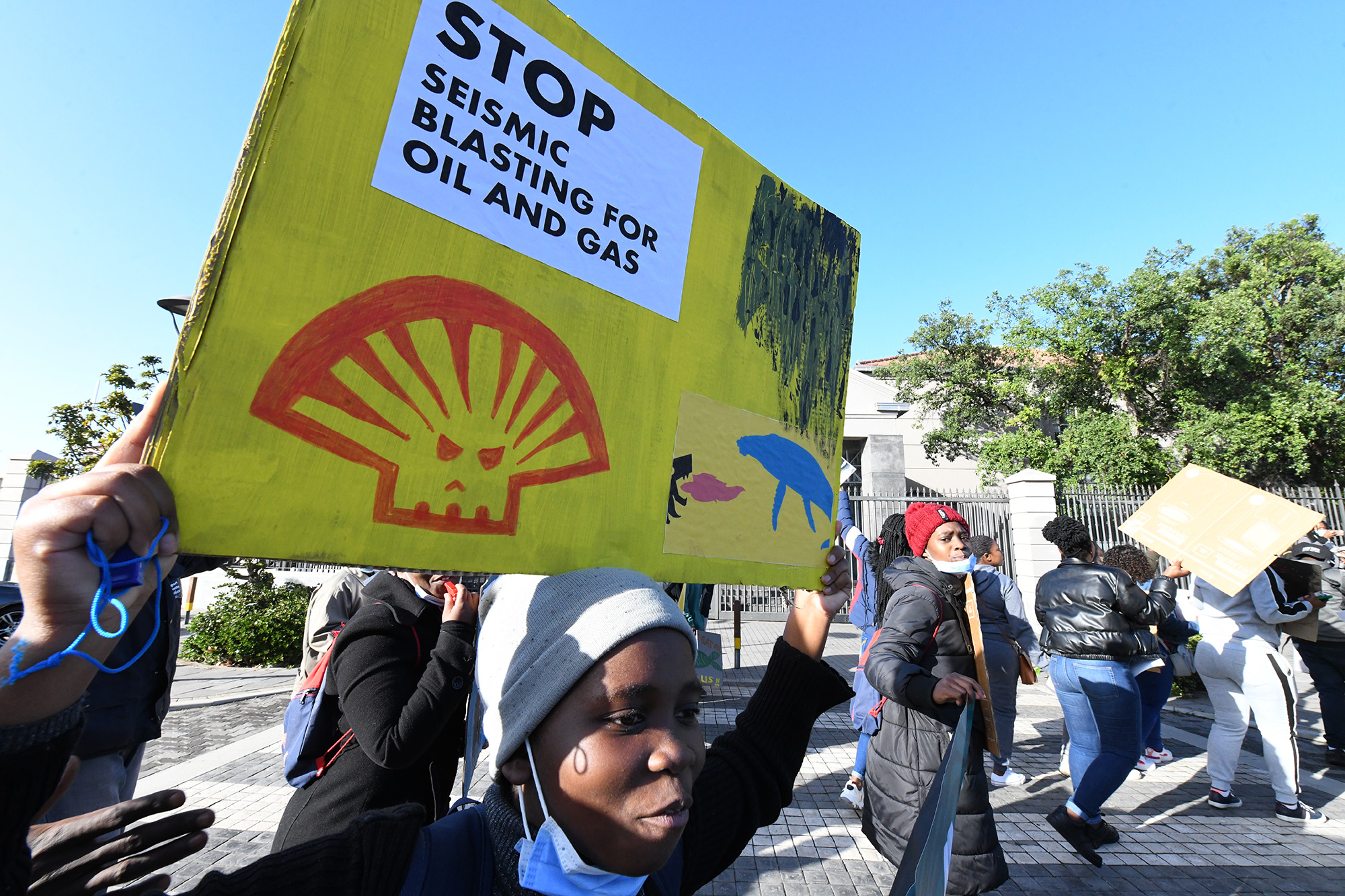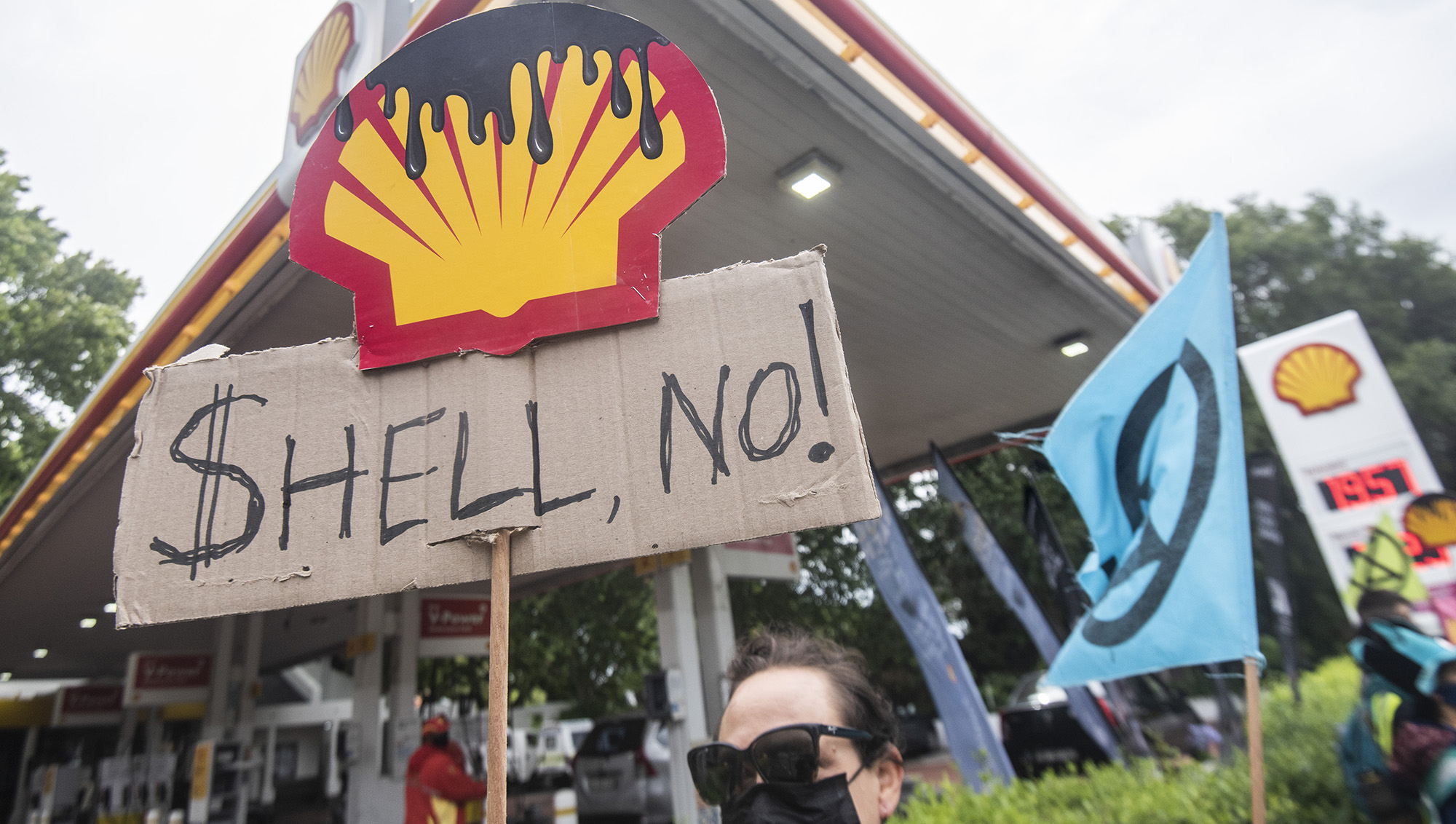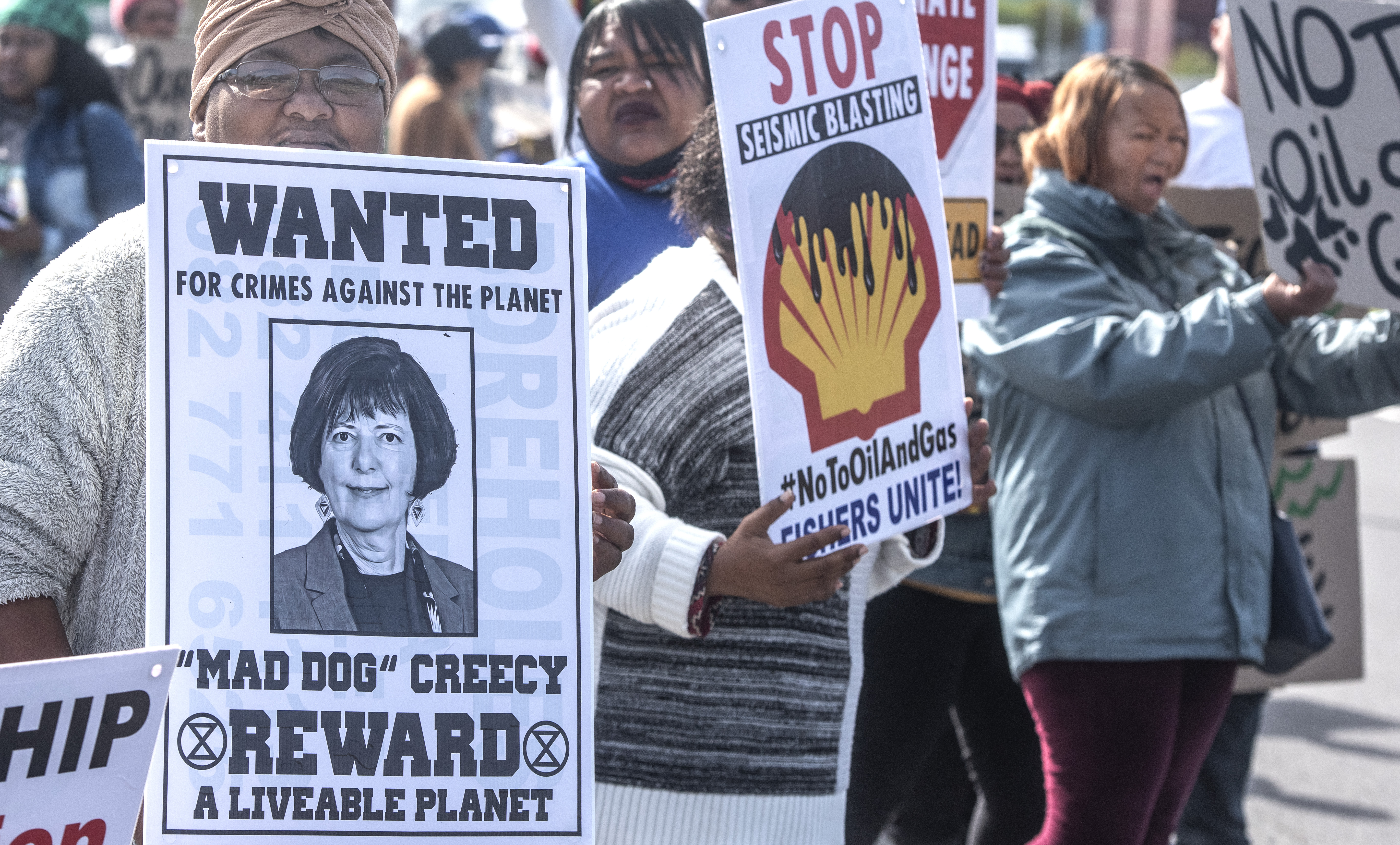OFFSHORE EXPLORATION
Shell, Impact Africa and Gwede Mantashe granted leave to appeal against judgment barring Wild Coast seismic survey

Wild Coast communities and environmental organisations were undeterred by the verdict and confident of winning in the Supreme Court of Appeal.
The Eastern Cape High Court has granted Shell, Impact Africa and Minister of Mineral Resources and Energy Gwede Mantashe leave to appeal against the 1 September judgment of the Makhanda High Court, which found that the exploration right granted by the minister under the Mineral and Petroleum Resources Development Act (MPRDA) to allow Shell to conduct seismic surveys off the ecologically sensitive Wild Coast of South Africa, was unlawful.
Wild Coast communities and NGO partners also sought leave to cross-appeal the Makhanda High Court’s decision not to consider whether Shell and Impact Africa required an Environmental Authorisation before commencing their seismic survey.

People in Gqeberha protest against a planned seismic survey off the West Coast on 30 May 2022. (Photo: Gallo Images / Die Burger / Lulama Zenzile)
A judgment on Tuesday, signed by the Judge President of the Eastern Cape High Court, Selby Mbenenge, and Judge Thandi Norman, also granted the environmental organisations and Wild Coast communities their cross-appeal.
The principal findings of the court in its judgment were that:
- There was no delay in bringing the application, hence the court did not have to inquire into whether any delay was condonable;
- The applicants made a proper case for being exempted from an obligation to exhaust internal remedies; and
- The granting of the impugned exploration right was not preceded by meaningful consultations… the factors that the applicants would have placed before the minister to inform the decision-making process were not considered.
“Mindful of the fact that it takes a single bad reason to render the entire decision reviewable and that the applicants had only to prove one ground of the review to succeed in assailing the grant of the exploration right, the court dealt with other review grounds, albeit in a truncated fashion,” said the court.
The court stated that the review and setting aside of the decision granting the exploration right and its renewals had given rise to the question of whether the applicants were entitled to an order declaring that Shell may not commence any exploration activities without seeking and obtaining an Environmental Authorisation in terms of the National Environmental Management Act.

Activists stand along the M3 in Newlands, Cape Town on 4 December 2021 during a protest against a seismic survey along the West Coast commissioned by Shell. (Photo: Gallo Images / Brenton Geach)
“The applicants for the leave to appeal contend that the delay beyond 180 days was per se unreasonable; the period between 29 April 2014 and 2 December 2021 when the review application was instituted constitutes an inordinate delay. They further contend… the enquiry is not when a particular applicant knew or ought to have known about the administrative action, but rather when the public at large might reasonably have been expected to have gained knowledge thereof,” said the court.
“The contention is also made that having regard to section 7 (1) of PAJA [Promotion of Administrative Justice Act], the court was prevented from embarking upon and pronouncing on the merits of the review application.
“Apropos the lack of meaningful consultations, the applicants for leave to appeal submit that there has been substantial compliance with regulation 3 of the regulations made in terms of the Mineral and Petroleum Resources Development Act 28 of 2002. The court in effect found that regulation 3 was unconstitutional and thus invalid whereas the communities had not challenged the constitutionality of the regulation,” read the judgment.
The court stated that the applicants for leave to cross-appeal implicated the judgment in the main on the basis that the Makhanda High Court erred in findings that since it had reviewed and set aside the exploration right there was no longer a dispute between the parties in need of resolution by way of a declaratory order.
“In our view, the applications for leave to appeal and cross-appeal do not pass muster; the appeal sought has no reasonable prospects of success. The view we take of this matter renders it unnecessary for us to delve deeply into this.
“We, however, point out a few aspects in further support of our conclusion that the applications for leave to appeal and cross-appeal lack reasonable prospects of success,” said the court.

Environmental activists from Extinction Rebellion and other organisations protest outside a Shell garage in Johannesburg on 11 December 2021. (Photo: EPA-EFE / Kim Ludbrook)
In dealing with undue delay, the court said it should be highlighted that the court was not dealing with a member or certain members of the public, but with certain communities such as the Dwesa-Cwebe community.
“The difference between a community and a member of the public is not without significance. If one has regard to the EMPr [Environmental Management Programme] insofar as it embodies comments and responses, it is apparent that Impact knew and appreciated that it was dealing with communities. The applicants for leave to appeal were mindful of the fact that there was no consultation with the communities but decided to rely on the monarchs to inform their communities. This, despite the fact that the monarchs themselves had made it clear that the communities had to be consulted.
Visit Daily Maverick’s home page for more news, analysis and investigations
“Therefore, the contention based on the ‘Outa principle’, that this court should have adopted a broader view of the public at large might reasonably be expected to have had knowledge of the action does not meet the threshold,” said the court.
It stated that criticism had also been levelled against the Makhanda High Court’s findings regarding the use of English and Afrikaans in the notices that purportedly notified the relevant communities of the seismic survey.
“It is contended that the regulations make provision for certain languages that should be employed in the notices and once those languages were used there was substantial compliance with the regulation. The findings reached by the court are consistent with the constitutional imperatives contained in section 6 of the Constitution which make isiXhosa an official language. Nothing whatsoever prevented Shell and Impact from using isiXhosa instead of Afrikaans and in any event, adopting a mode of communication that would guarantee access to all relevant communities,” stated the court.
The court said the parties agreed that this matter was of significant importance and required ventilation by the Supreme Court of Appeal.
“We also agree. In matters involving statutory interpretation, courts have inclined towards granting leave because statutory interpretation is not an exact science. It therefore behoves us to grant the parties the leave they are seeking,” said the court.

About 100 fishers and activists protest near Cape Town Harbour entrance in Paarden Island on 15 August 2022. Small-scale fishers and civil society are demanding sustainable energy solutions and a halt to offshore oil and gas exploration. (Photo: Gallo Images / Brenton Geach)
The applicants who took the matter to court, including Wild Coast communities, Sustaining the Wild Coast, All Rise, Natural Justice and Greenpeace Africa, remain confident that a higher court will rule in their favour.
In a statement on Tuesday, the applicants said that in the Makhanda High Court, the main issues they argued related to an exploration right granted to Impact Africa and Shell which would allow them to conduct seismic testing off the coastline — which the applicants argued was unlawful because of a lack of meaningful public participation, lack of consideration of the cultural rights of communities and because an environmental impact assessment should have been conducted.
“On appeal, Shell, Impact Africa and the minister of mineral resources brought two preliminary issues: the delay by the communities and NGO partners in the bringing of the review and whether the communities and the NGO partners should have pursued an internal appeal to the minister prior to approaching the court — as is required by the Promotion of Administrative Justice Act (PAJA). They also argued that they followed the letter of the law in consulting with the public, and cannot be held to higher standards than that,” read the statement.
Reaction
Cormac Cullinan of Cullinan & Associates said they were delighted that the Eastern Cape High Court had found that the appeal had no reasonable prospects of success and had only granted leave to appeal to enable the Supreme Court of Appeal (SCA) to pronounce on these important issues.
“We are confident that the SCA will uphold the landmark judgment of the full court of the Eastern Cape High Court and establish important precedents that bind all divisions of the high court.
“It is particularly important that the SCA upholds the rights of both the public and those most directly affected, to participate in decisions regarding new fossil fuel projects and ensures that no offshore exploration or drilling is authorised in the absence of a full consideration of the climate change implications, the potential impacts on marine species and people who depend on coastal environments, and a consideration of whether or not these projects are necessary and desirable,” said Cullinan.
Melissa Groenink-Groves, an attorney at Natural Justice, said they were not surprised by the outcome, as the court had granted the leave to appeal on the basis of public importance.
“This case is critical for setting important judicial precedents relating to oil and gas exploration. This case deals with what constitutes meaningful public participation, and the importance of considering the impacts of oil and gas developments relating to climate change, cultural heritage, and the interests of the whole marine community. We are strong on the merits and welcome the Supreme Court of Appeal’s consideration of this matter,” she said.
Nonhle Mbuthuma, of the Amadiba Crisis Committee, said: “The climate crisis is of great importance, [Shell] cannot make excuses any longer. We are ready to continue this fight.”
Sinegugu Zukulu of Sustaining the Wild Coast said: “This case is a matter of life and death for coastal communities whose livelihoods depend on the ocean. This is also about a global fight against climate change. We cannot allow profiteering to drive us and our planet to extinction.”
Melita Steele, Greenpeace Africa programme director, said Greenpeace Africa was not deterred by the court’s decision to grant Shell leave to appeal.
“The outcome of this case will have far-reaching impacts on the livelihoods of local communities and the survival of biodiverse ecosystems, and we will continue to support the Wild Coast communities’ resistance against Shell and pursue the legal avenues to stop Shell.
“We must do everything we can to undo the destructive colonial legacy of extractivism until we live in a world where people and the planet come before the profits of toxic fossil fuel companies,” said Steele.
Wilmien Wicomb, of the Legal Resources Centre, said: “Given the novelty and significance of the judgment and its extraordinary importance for communities around the country that bear the brunt of extractivism and climate change, it is in the public interest for the Supreme Court of Appeal to rule on the matter. The battle for our clients continues.” DM/OBP






















 Become an Insider
Become an Insider
Comments - Please login in order to comment.